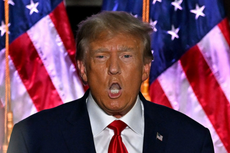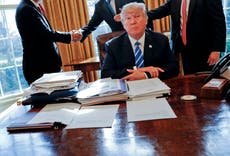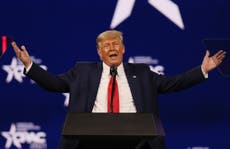Conspiracy, false statements and retaining national defence documents: The federal charges against Trump
The federal indictment against the former president includes 37 counts stemming from his mishandling of classified files at Mar-a-Lago
Your support helps us to tell the story
This election is still a dead heat, according to most polls. In a fight with such wafer-thin margins, we need reporters on the ground talking to the people Trump and Harris are courting. Your support allows us to keep sending journalists to the story.
The Independent is trusted by 27 million Americans from across the entire political spectrum every month. Unlike many other quality news outlets, we choose not to lock you out of our reporting and analysis with paywalls. But quality journalism must still be paid for.
Help us keep bring these critical stories to light. Your support makes all the difference.
Donald Trump has now become the first current or former president to be arrested on federal charges in the history of America.
On Tuesday 13 June, the former president was arrested and arraigned on 37 counts in a federal indictment stemming from the US Department of Justice investigation into his possession of classified documents at his Mar-a-Lago property.
Federal prosecutors charged the former president with willful retention of national defense secrets in violation of the Espionage Act, conspiracy to obstruct justice, corruptly concealing documents, concealing documents in a federal investigation, scheme to conceal, and making false statements.
Thirty-one counts relate to each document alleged in his possession, five counts relate to Mr Trump concealing them, and two counts relate to false statements.
A potential sentence, if convicted, could include decades in prison.
Mr Trump surrendered to authorities at Miami federal court where he was arrested and formally charged.
He pleaded not guilty to the charges and flew straight back to New Jersey to deliver a speech at his Bedminster golf club in New Jersey where he launched into his usual unsubstantiated narrative that he is the victim of political persecution and lashed out at President Joe Biden and Special Counsel Jack Smith.
The federal indictment was unsealed on 9 June.
An investigation from special counsel Jack Smith, who was appointed to lead the Justice Department’s probe into the former president’s alleged mishandling of documents after leaving the White House, has been looking into whether Mr Trump and his lawyers falsely certified that he returned classified records to the government, or whether he concealed them, illegally, and lied to his legal team.
Federal prosecutors are expected to present compelling evidence that the former president knowingly and deliberately misled his attorneys about his retention of sensitive documents after leaving the White House in January 2021 after losing his re-election bid.
Among the mounds of documents in his possession when they were collected by FBI agents were 102 classified documents – 27 were in his office, 75 were in storage, and 17 “top secret”-designated documents were among them, according to prosecutors.
Several included nuclear weapons capabilities of the US and foreign nations, potential vulnerabilities of the United States and its allies to military attack” and “plans for possible retaliation in response to a foreign attack,” according to the indictment.
The indictment states that Mr Trump’s possession “could put at risk the national security of the United States.”
Willful retention of national security information
The frontrunner for the 2024 Republican presidential nomination is charged with violations under the Espionage Act, which the Justice Department invoked against now-former National Security Agency translator Reality Winner while Mr Trump was president in 2018. Julian Assange and Daniel Hale also were charged under the Espionage Act in 2019.
Mr Trump now faces 31 counts under that same charge.
One of the six sections under the Espionage Act, Section 793, prohibits “gathering, transmitting or losing” any “information respecting the national defence”.
Counts one through 31 in Mr Trump’s federal indictment include individual documents in his possession from 20 January 2021 until 6 August 2022 or 3 June 2022.
The documents include documents designated “secret” and “top secret”, related to White House intelligence briefings, foreign military activity, communication with foreign leaders, foreign military impacts on US interests, and communications with a foreign leader.
At least one document concerns US nuclear weaponry
Another involves nuclear capabilities for a foreign government.
The use of Section 793, which does not make reference to classified information, is understood to be a strategic decision by prosecutors that has been made to short-circuit the former president’s ability to claim that he used his authority as president to declassify documents he removed from the White House and kept at his Florida property long after his term expired on 20 January 2021.
That section of US criminal law is written in a way that could encompass Mr Trump’s conduct even if he was authorised to possess the information as president. It states that anyone who “lawfully having possession of, access to, control over, or being entrusted with any document … relating to the national defence” and “willfully” transmits such information in any way can face a prison sentence of up to 10 years.
Obstructing justice, conspiracy and withholding records
The former president and Walt Nauta “did knowingly combine, conspire, confederate and agree” to withhold documents under Section 1512 under Title 18 of US code, according to the indictment.
The statute includes a broad prohibition against tampering with a witness, victim or informant involved in a federal investigation.
According to prosecutors, Mr Trump conspired to conceal documents from a grand jury and federal officials, by suggesting that his attorneys make false statements to authorities, by moving boxes of documents to hide from attorneys, by suggesting that documents be hidden or destroyed, and falsely certifying that classified documents were produced to authorities “when, in fact, they had not.”
The statute applies to matters before Congress as well as federal agencies and civil and criminal judicial proceedings, including grand jury proceedings. A conviction includes a maximum sentence of 20 years in prison.
In a case before a jury, federal prosecutors must prove whether Mr Trump knowingly retained documents under the National Archives and Records Administration’s custody, and willfully defied the Justice Department’s subpoena for classified documents in his possession. A conviction includes a penalty of up to 20 years in prison.
An additional charge of conspiracy, which would need to include another person in order to commit a crime, could carry a sentence of five years.
False statements and representations
Mr Trump faces additional charges for making false statements, or allowing his legal team to make false statements, for allegedly lying to law enforcement about the documents in his possession. That could include an additional five-year sentence, if convicted.
According to the indictment, the former president made a “materially false, fictitious and fraudulent statement” when he swore to a grand jury investigation and federal law enforcement probe that he provided all documents as requested.
A federal indictment against Mr Trump arrives days after a last-ditch attempt by his legal team to convince Justice Department officials against charging him.
Investigators launched a probe early last year after officials with the National Archives and Records Administration discovered more than 100 documents bearing classification markings while reviewing 15 boxes retrieved from Mr Trump’s Mar-a-Lago home. US Attorney General Merrick Garland appointed Mr Smith, a former war crimes prosecutor at The Hague, as special counsel to lead the probe.
An indictment serves as a formal accusation, among a prosecutor’s first steps before a case can be brought to trial.
Grand jurors heard evidence and testimony brought forward from prosecutors and witnesses they chose to present. In a trial, a jury will hear from defence attorneys.
Following Mr Trump’s formal indictment, prosecutors will share evidence with his legal team who likely begin motions to dismiss the case.
Andrew Feinberg contributed reporting
Subscribe to Independent Premium to bookmark this article
Want to bookmark your favourite articles and stories to read or reference later? Start your Independent Premium subscription today.






